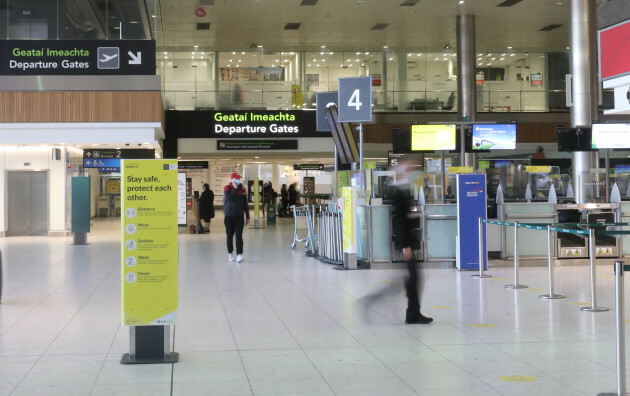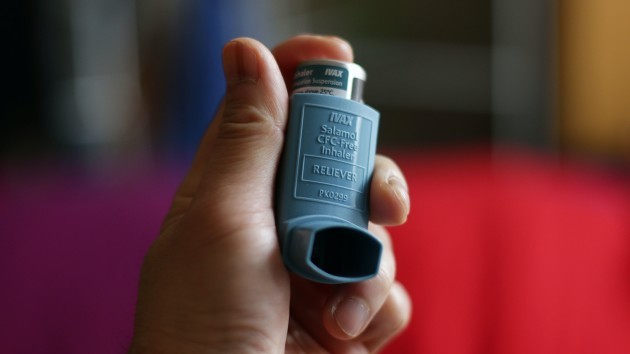THROUGHOUT THE PANDEMIC, numerous social media posts have featured claims about Covid-19 and vaccines by former Pfizer employee Mike Yeadon.
Yeadon, a retired British scientist, has been a vocal critic of health authorities for introducing lockdown measures, requirements to wear face masks and rolling out vaccines against Covid-19.
His credibility has been enhanced among lockdown sceptics because of his former role at Pfizer, the pharmaceutical company which has developed one of the main vaccines against the virus.
Yeadon spent more than a decade and a half at the company as an allergy and respiratory researcher, though he left the firm in 2011.
Some posts on social media occasionally misstate Yeadon’s role at Pfizer, appearing to give him more prominence at the company than he actually had.
A claim by him that was debunked by The Journal in December referred to him as a former vice president of the company. However, he was a former vice president in Pfizer’s allergy and respiratory research division only.
Yeadon’s claims about Covid-19 regularly feature on anti-lockdown and anti-vaccine pages, but many are incredibly misleading or do not stand up to evidence at all.
Here is the truth behind some of his more common claims.
Claim 1: Covid-19 is not a new illness and is caused by a virus that’s like other ‘harmless’ viruses
Yeadon has regularly sought to downplay the impact of Covid-19 by claiming that the virus which causes it, SARS-CoV-2, is not new but the same as previous coronaviruses.
But this is false: Covid-19 is a new illness and SARS-Cov-2 is a unique virus.
The illness is called Covid-19 because it is a coronavirus disease that was first detected in 2019. The first known infections from SARS‑CoV‑2 were in Wuhan in China in December that year, with investigations underway as to the original source of the virus.
The following month, the WHO even recommended calling the virus 2019-nCov, standing for ’2019 novel coronavirus’.
The European Centre for Disease Prevention and Control specifically states that SARS-CoV-2 is a new strain of coronavirus that has not been previously identified in humans.
It is also wrong to suggest that SARS-CoV-2 is the same as other coronaviruses.
There are many different types of coronaviruses, which generally circulate in animals. But very few of these have spread to humans and can be transmitted between humans.
Only six ‘species’ of human coronavirus are known, one of which – SARS-CoV – has split into two different strains, giving seven strains of human coronavirus in total.
Four of these – OC43, HKU1, 229E and NL63 – are relatively harmless. They generally cause symptoms of the common cold, or other upper respiratory tract infections.
The other three strains have caused serious illness and death in humans.
SARS-CoV-2 is a close genetic relative of the original SARS-CoV virus, which caused the SARS epidemic earlier this century, but they are not the same.
SARS was far from a “harmless” illness: by the end of the SARS epidemic in June 2003, the virus had infected 8,422 people – around 10% of whom died.
And MERS-CoV, which caused Middle Eastern Respiratory Syndrome (MERS), has infected fewer people but is even more deadly than both SARS viruses.
There have only been 2,574 confirmed cases of MERS since it first began spreading in 2012, but 866 people have died – a fatality rate of about 34%.
In short, each of the seven human coronaviruses are unique, and some are far more damaging than others.
But it is incorrect to claim the virus that causes Covid-19 is the same as other coronaviruses and to imply that it is therefore not harmful.
Claim 2: If you’ve had a cold, you’re immune from Covid-19
Yeadon has varied his claim about other coronaviruses to suggest that the majority of people had immunity to Covid-19 before SARS-CoV-2 ever started circulating, because most of us have had common colds.
But this has not been proven. What’s more, symptoms of the common cold are sometimes caused by different types of virus to SARS-CoV-2.
Common colds are not just caused by coronaviruses: different virus families such as rhinoviruses, respiratory syncytial viruses and parainfluenza viruses can also cause mild colds in people.
In theory, the transmission of SARS-CoV-2 could be inhibited among those who have had one of these viruses and other types of coronaviruses.
Studies are ongoing to assess how much immunity cold-causing coronaviruses provide against SARS-CoV-2.
One such study, in the Journal of Clinical Investigation, linked these coronavirus infections to less severe cases of Covid-19 in people who caught the latter.
Other studies are also looking into other different types of infection. But none of these studies are conclusive or suggest in any way that a person who has had one form of coronavirus can’t get Covid-19. Research is still ongoing.
For the time being, it is untrue to state that those who have had a common cold are immune from Covid-19.
Claim 3: There is almost no difference between Covid-19 variants
One of the more common claims attributed to Yeadon is the suggestion that Covid-19 variants of concern are not a bigger threat to people than other strains of the virus.
Multiple iterations of this claim have circulated on social media in recent months, both in videos featuring Yeadon and as part of image-based posts where someone has shared a photo containing quotes purporting to be from him.
In a recent video interview posted online, Yeadon downplayed the difference between different Covid-19 variants by mockingly referring to them as “same-iants”.
In another video, he claimed that all Covid-19 variants are, at most, 0.3% genetically different from each other.
And an image containing a quote by Yeadon further claims that “all variants are at least 99.7% identical to the Wuhan sequence”.
But these claims are misleading because they imply that there is virtually no difference in variants of SARS-CoV-2 (the virus that causes Covid-19). We know that this is not true from the impact that different variants of concern have had during the pandemic.
The isolation of the virus in laboratory settings has enabled scientists to identify thousands of mutations of SARS-CoV-2 since the beginning of the pandemic last year.
This is a natural process. As a virus replicates and transmits from person to person, its genes experience certain ‘copying errors’ (that is, genetic mutations).
One form of virus with a ‘copying error’ can then undergo another ‘copying error’ the next time it replicates, which can ultimately lead to changes in how the virus works.
It’s basically an evolutionary process for the virus, and the reason why certain forms of virus – like ones which make SARS-CoV-2 transmit more easily – become dominant.
Of course, mutations which make the virus more infectious or cause more severe illness are concerning to public health officials.
Variants including B117 (the ‘Kent variant’), 501.V2 (the ‘South Africa variant’), B16172 (the variant first identified in India) and P1 and P2 (both identified in Brazil) have all caused officials to sit up and take note because they have presented huge challenges.
These variants either made the virus more transmissible (as was the case with B117), or they were associated with higher levels of severe illness in younger people (P1 and P2), or they caused certain vaccines to be less effective (501.V2).
Despite being very similar to other strains of SARS-CoV-2, these variants still managed to ravage the countries where they circulated – often causing more pressure on hospitals which in some cases lead to more deaths and worse outcomes.
It is misleading to suggest that all variants are the same.
Claim 4: Covid-19 is not a threat or fatal to anyone below the age of 60
Like many before him, Yeadon has also suggested that the risk of Covid-19 is overplayed because it primarily affects older people.
But this claim is false: Covid-19 is a risk to people of all ages and the virus has killed young people.
In general, the virus is more likely to cause adverse outcomes in those who are older. Younger people are less likely to require hospital treatment, but both hospitalisations and deaths have occurred in younger populations.
Younger people can get very sick with Covid-19 and occasionally die as a result of the virus.
Latest data from the Health Protection Surveillance Centre (which is only available up to 12 May because of the HSE cyber attack) shows that in Ireland, 54 people under the age of 45, 88 people aged between 45 and 54, and 266 people aged 55 to 64 have died from Covid-19.
Furthermore, death is not the only outcome from Covid-19.
Many of those who contract the virus, including young people, continue to suffer from after-effects for months following infection, while the WHO has said that some patients “develop medical complications that may have lasting health effects”.
In a US study among those aged 18 to 34 years who were in good health before they contracted the virus, 20% reported that some symptoms were prolonged.
The WHO further warned that long-term health problems as a result of Covid-19 could include heart failure, lung failure, loss of smell, cognitive impairment, fatigue and anxiety and depression.
The group also says that as a new illness, it still not fully known what the long-term effects of the virus are and more time and research is needed to understand them.
It is misleading to suggest that Covid-19 only affects older people, and it is untrue to say it is not fatal to those under the age of 60.
Claim 5: Covid-19 is not transmissible when a person is asymptomatic
Another claim made by Yeadon and others is that people who have Covid-19 can’t spread it to others when they don’t have any symptoms of the virus.
A related claim is that a person who is asymptomatic doesn’t need to wear a mask, because they can’t give Covid-19 to someone else.
These claims are completely untrue. Scientific evidence shows that a person with Covid-19 can spread the virus to someone else, even if they don’t have any symptoms.
Australian Associated Press previously debunked claims like this by Yeadon here.
The agency pointed to multiple studies which show that those infected with SARS-CoV-2 can still pass it on to others despite showing no symptoms.
They include a 2020 review of evidence on asymptomatic SARS-CoV-2 infection, published in the American College of Physicians’ Annals of Internal Medicine.
That study suggested that asymptomatic patients could transmit the virus to others for more than 14 days, and it also suggested there was a 40-45% chance that a person with Covid-19 would be asymptomatic.
The US-based Centers for Disease Control and Prevention (CDC) also published a study in January which estimated that asymptomatic patients accounted for more than half of all Covid-19 transmissions, based on an analysis of eight studies from China.
And the World Health Organisation (WHO) also states that people with Covid-19 “can transmit the virus both when they have symptoms and when they don’t have symptoms”.
It follows that asymptomatic patients should wear masks to stop themselves from spreading the virus to others. It is untrue to claim that they cannot spread the virus.
Claim 6: Closing borders to stop Covid-19 and variants being imported is a ‘pointless’ measure
Elsewhere, Yeadon has suggested that the closure of international borders to stop the spread of Covid-19 is a “pointless” health measure.
He has suggested that variants arrive “spontaneously” and that closing borders is like “having six inches of water on your ground floor and trying to close the door”.
But this only makes sense for countries where Covid-19 and variants of concern are already circulating.
Closing borders or quarantining people arriving from countries with high levels of Covid-19 or where variants are circulating can be an effective public health measure.
Several countries have closed their borders at various stages of the pandemic.
According to an analysis of 29 studies about border closures published on medRxiv and cited in the journal Nature, most models show that travel restrictions and border closures reduced the arrival of people with Covid-19 in many countries.
Another modelling study published in The Lancet in December also found that earlier in the pandemic, international travellers would have contributed to 10% of cases in 102 countries, though their contribution to cases would have dropped later in the pandemic.
That study said that countries can expect people with Covid-19 to arrive if there are no travel restrictions in place.
It also highlighted that stringent travel restrictions can stop high rates of Covid-19 in countries where incidence is low, if a local epidemic was at a tipping point, and if large numbers of passengers would arrive if restrictions were not in place.
However, the study also said that local epidemics can continue to rage even when travel restrictions are in place and that stringent restrictions have little effect in countries where the incidence is high.
Nevertheless, closing borders in some circumstances is effective at stopping the spread of Covid-19.
It is also important to point out that The Lancet study was published in early December, weeks before the B117 variant began circulating in the UK and Ireland and other variants of concern were identified in South Africa and Brazil.
B117, which in recent months made up more than 90% of cases in Ireland, has repeatedly been described by public health officials here as like a new virus.
It began circulating in Ireland after arriving from the UK before Christmas and going by the logic of The Lancet study, stringent border controls would have prevented this ‘new’ virus getting a foothold here if they had been in place.
Similar measures, including mandatory hotel quarantine, have since acted as a buffer to help prevent other ‘new’ versions of the virus – including variants first identified in Brazil, India and South Africa – from gaining a foothold here.
On Thursday, Health Minister Stephen Donnelly told the Dáil that the hotel quarantine system had detected 59 cases of variants of concern: 47 cases of B117 and 12 cases of P1.
That meant 59 cases of new forms of the virus were caught, which could have spread in the community if the hotel quarantine system had not been introduced.
As well as stopping the spread of Covid-19, closing borders and introducing border restrictions can be effective at limiting the spread of variants as well.
No news is bad news
Support The Journal
Your contributions will help us continue
to deliver the stories that are important to you
Claim 7: Hydroxychloroquine, asthma inhalers, Vitamin D and ivermectin are effective treatments against Covid-19
Throughout the pandemic, many supplements and forms of medicine have been posited as treatments against Covid-19.
Another claim by Yeadon suggests that hydroxychloroquine, inhaled steroids, Vitamin D and ivermectin are all effective against the virus.
Although some of these treatments can help alleviate symptoms, it is misleading to suggest that the virus or adverse outcomes from it can be prevented by using them alone.
These treatments may help those who have already contracted Covid-19 – and it’s important to note that studies are still working out whether this is the case – but they will not prevent a person from catching the virus or from being hospitalised by it.
Full Fact has previously debunked claims that Vitamin D, the anti-malaria drug hydroxychloroquine and Ivermectin are effective treatments against the virus.
Studies – including one carried out by researchers at Trinity College Dublin – have pointed to links between lower levels of vitamin D and the severity of infection in those who contract Covid-19.
A study of Covid-19 patients at Connolly Hospital in Blanchardstown also showed that those admitted to intensive care and put on ventilators had lower levels of vitamin D.
A recent report published by the Oireachtas found that people in Ireland should take Vitamin D to boost their immune systems.
However, it said that this works primarily as a way to fend against the severe impact of Covid-19 before infection, rather than as a treatment after a person becomes infected.
Similarly, there is no evidence that hydroxychloroquine has treated or prevented Covid-19. In March, the World Health Organisation recommended against using it as a treatment, citing no meaningful effect on death or admission to hospital from the virus.
There has been some debate about the use of Ivermectin to treat Covid-19, with studies showing that it can effectively reduce the replication of SARS-CoV-2, but only at doses higher than would be used in humans.
Although it has been used in some countries, current evidence about the use of Ivermectin as a Covid-19 treatment is inconsistent.
There are also questions as to how effective asthmas inhalers are against the virus.
A recent study did find that a small number of Covid-19 patients who took Budesonide – who had not yet been admitted to hospital – had a shorter recovery time.
But the study was limited and did not find that any asthma inhaler will prevent a person from contracting the virus in the first place.
The HSE recommends that asthmatics take their preventer inhaler to decrease the risk of having an asthma attack, but there is no official guidance about their use here.
Claim 8: PCR testing is not reliable
Like others, Yeadon has suggested that the use of PCR tests to detect Covid-19 is not reliable. He has also claimed that the tests produce a high number of false positives.
However, PCR tests are quite reliable at detecting Covid-19 but are far more likely to result in false negatives – where a person has the virus but their test result says they do not.
We’ve previously looked at both these claims here.
Claim 9: Covid-19 vaccines are not safe or effective
Yeadon has also attempted to undermine the rollout of vaccines against Covid-19, claiming that they are unsafe and ineffective against fighting the virus.
Neither of these things are true.
Covid-19 vaccines have proven incredibly safe, while preliminary data from multiple countries shows it is highly effective in reducing adverse outcomes from the virus.
We previously looked at evidence supporting the use of Covid-19 vaccines here.
Claim 10: The Covid-19 vaccine is killing people and leading to a large number of serious adverse events
Yeadon has also made various claims suggesting that Covid-19 vaccines are causing high rates of death.
In one claim, he states that more people have died after being given Covid-19 vaccines than the number of people who have died after being given every other type of vaccine combined, over a period of 30 years.
He has also claimed that a large proportion of people who’ve been vaccinated so far have experienced serious adverse reactions.
Both of these claims purposely inflate the level of risk posed by vaccines, and are misleading about how safe vaccines actually are.
It’s important to state: all vaccines approved for use in human populations, including Covid-19 vaccines, have been rigorously tested, are consistently monitored, and are among the safest medical products in the world.
We have previously looked at the safety record of vaccines here.
In summary, they are incredibly safe: more than a billion people around the world have been given a dose of a Covid-19 vaccine – including 2.5 million people in Ireland.
It’s not possible to put an exact figure on it, but the overwhelming majority of these people are still alive. And most those who died did not succumb to effects from the vaccine.
Here, the Health Products Regulatory Authority (HPRA) has previously explained that there will inevitably be deaths among people who have received the Covid-19 vaccine.
This is especially because many people who received the vaccine at the beginning of the rollout were older or vulnerable patients.
That does not mean these people died as a result of getting the Covid-19 vaccine.
What’s more, saying that a “large proportion” of people have experienced adverse events is not proof of anything if it is not put in proportion to anything else.
A ‘large’ number of people could be whatever a person wants it to be: 30 people in a room could be considered a ‘large’ number, as could a crowd of 50 people outdoors somewhere.
But 30 or 50 people out of billions worldwide is an infinitesimal proportion.
In Ireland, around 2.5 million people have had at least one dose of the vaccine. But figures released earlier this month by the HPRA state that just 7,862 people have self-reported any kind of suspected side-effect – including minor ones.
It is important to clarify that these reports are also based on the suspicion that a person has experienced an adverse effect, and that it does not mean that the symptoms were caused by a vaccine.
In contrast, because the reporting system is voluntary, not all suspected side-effects will be monitored either.
Regardless, they are the only official figures that Ireland has about suspected side-effects. And they suggest that the number of severe adverse side-effects is small relative to the overall number of people who’ve been vaccinated.
There are fears about the AstraZeneca and Johnson & Johnson vaccines causing clots in younger people, and the National Immunisation Advisory Committee has recommended that these shots be given to older people as a result.
However, these clots are incredibly rare. There have been no reported deaths in Ireland as a result of either of these vaccines, and very few elsewhere.
It is misleading to suggest that vaccines are causing a high number of of deaths or serious adverse effects in people.










